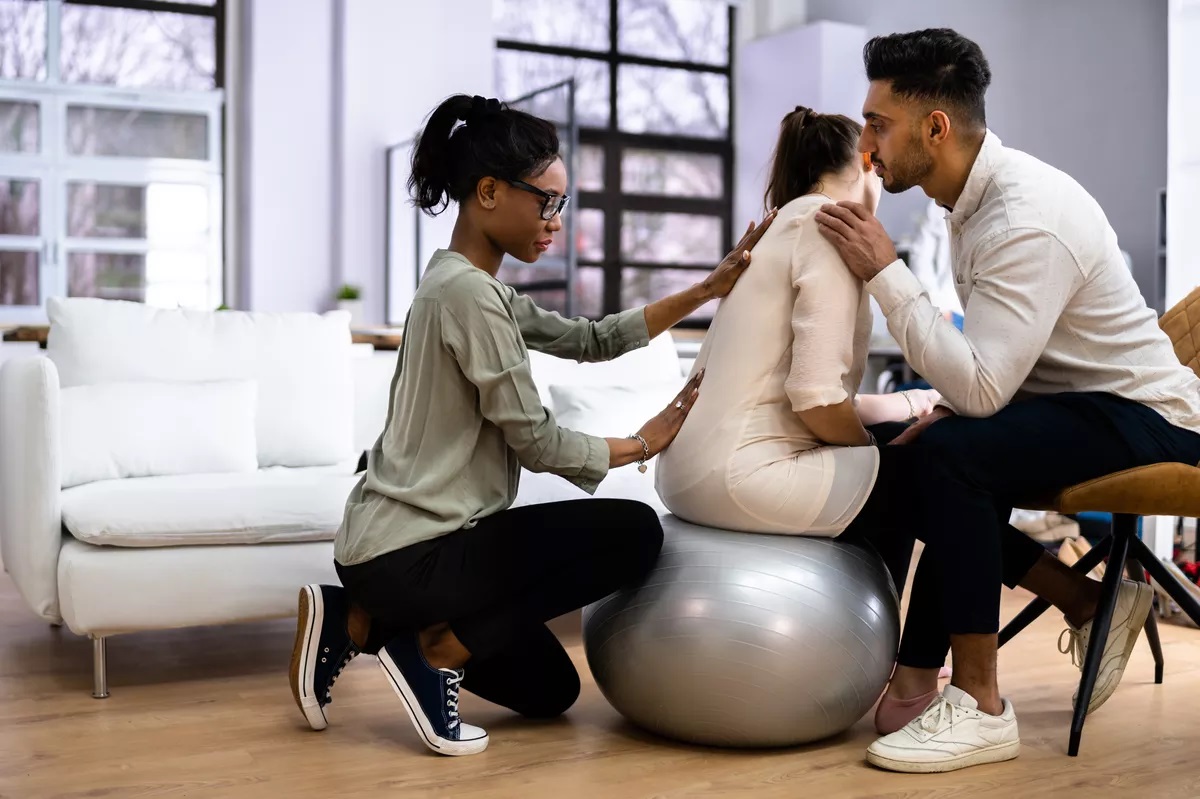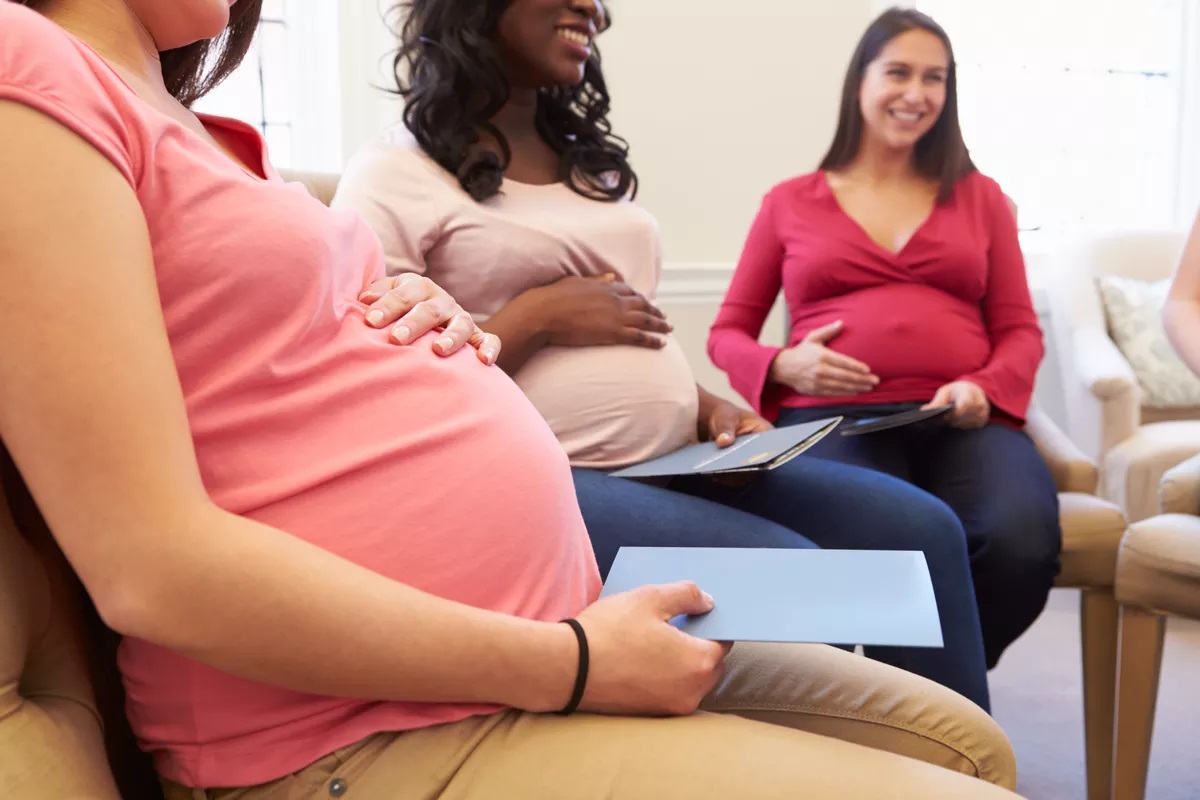👋 Welcome to Starting Early. Every other week, we spotlight new reports, useful news, engaging interviews with people doing important work, and interesting takes on maternal health and early childhood development issues.
We’ve covered topics ranging from Medicaid to maternal mortality, and this week, we’re very excited to cover a pivotal moment for our organization. Guided by compelling evidence, we at the Burke Foundation believe investing in the earliest years provides lifelong benefits for children and their families. Over the past 5 years, we’ve supported community-centered initiatives to bolster health and wellbeing during that period of life, with particular emphasis on communities of color — where glaring disparities threaten development. Building on these efforts, we’re excited to announce the next chapter of the Burke Foundation’s strategic vision.
The new strategy pairs primary prevention in the earliest years with wraparound services for caregivers with young children — delivered by a community-based workforce — to support healthier families, homes, and neighborhoods by focusing on four vital initiatives aimed at revolutionizing the continuum of care for children and families. The initiatives are:
- Universal newborn home visiting
- Community doulas
- CenteringPregnancy and CenteringParenting
- HealthySteps
To complement these investments, we’ll also invest in growing, diversifying, and sustaining the state’s maternity workforce to deliver enhanced, strengths-based, patient-centered care to women and families by increasing the number of community doulas, public health nurses, and midwives to increase economic opportunities and reduce maternal and infant mortality.
Our vision is to create intergenerational impact in economic mobility, health, and wellbeing by transforming health systems to deliver better care, prevention, and community connections during that First 1,000 Days for babies, mothers, fathers, and families. Read more about the initiative here and see a beautiful visual illustrated by Ashanti Gardner.
We want your feedback: We couldn’t have gotten to where we are today in our journey without our partners: community organizations, state agencies, and other dedicated stakeholders. Please share your thoughts on our new strategy or connect with us to learn more.
Read on and click the links to go deeper.
1. A game changer for moms, babies, and families

An early childhood field scan that Burke conducted in 2017 identified home visiting programs as a research-backed method to improve child wellbeing and support healthy, nurturing parent-child relationships. Seeing the benefits of home visiting on a trip to the Center for Child & Family Health in Durham, NC inspired us to pursue a universal newborn home visiting program in New Jersey.
Universal support: For the past 2 years, we’ve invested in a Family Connects pilot in Mercer County in partnership with the New Jersey Department of Children and Families, Trenton Health Team, and the Central Jersey Family Health Consortium. Family Connects is a national model through which registered nurses visit families with newborns, regardless of a family’s socioeconomic status. The visiting nurses provide timely education, clinical assessments, and vital referrals to community services that meet the needs of the household. The visits enable nurses to check on the health and wellbeing of babies and mothers at a time of highest risk for physical and mental health complications. This approach is proven to:
- Reduce emergency room visits and hospital overnight stays in the first year of life
- Reduce likelihood of experiencing postpartum depression or anxiety
- Increase positive parenting behaviors, like skin-to-skin contact and reading to infants
A statewide movement: Thanks to legislative advocacy led by State Senators Teresa Ruiz and Joe Vitale, New Jersey became the second state in the nation to adopt universal newborn home visiting when Gov. Phil Murphy signed legislation establishing a statewide universal newborn home visitation model. This is another example of New Jersey’s emergence as a leader in adopting proven strategies to advance equitable perinatal healthcare and wellness. First Lady Tammy Murphy championed the Nurture NJ strategic plan, a roadmap for making the state the safest and most equitable place in the US to have and raise a baby.
To help launch universal newborn home visiting in 2022, Burke will:
- Help address the state’s critical nursing shortage through efforts to build a diverse nursing pipeline
- Design a communications and marketing strategy to spark public awareness
- Share critical learnings from the Mercer County pilot with those involved in statewide implementation efforts
- Serve on a statewide leadership advisory board that will provide guidance on implementation
2. Bringing quality perinatal care to more families

Anyone who knows the Burke team knows the admiration we have for doulas. ❤️ Community doulas are trained professionals who provide physical, emotional, and informational support to mothers before, during, and just after birth. They play an important role on a maternal health team and can help mitigate problems during pregnancy and birth. Because these doulas come from the same communities as the people they serve, they are effective in addressing racial disparities in maternal health. Our initiatives have seen a 73% reduction in preterm births and served more than 120 families in Trenton.
- But demand far outpaces supply: There are fewer than 120 doulas in New Jersey — not nearly enough to serve the estimated 30,000 women enrolled in Medicaid who deliver babies in the state.
To meet this need, our goal is to train 1,000 community doulas over 5 years to serve 50% of Medicaid births in New Jersey. We’ll also work in partnership with doulas; a doula-led advisory board will guide the design of trainings and help us explore potential career pathways and sustainability models.
It’s a community ripple effect: “The doula program is more than just a maternal health solution. The doulas we trained are now about to become trainers themselves. They are truly the custodians: they have the expertise, and the competency. I think that has been an “ah hah” moment for me – it’s more than addressing maternal and infant health. It truly is about lifting up a community.” – Lisa Asare, Assistant Commissioner for the Division of Family Services at the New Jersey Department of Health
3. Transforming healthcare systems to build community and improve outcomes

“It didn’t take much to get us talking, laughing, and commiserating. Sometimes it felt a lot like a support group, and that’s part of the point. The goal of CenteringPregnancy is to provide medical care and to educate, but also to reduce stress and isolation.” – NPR contributor Jenny Gold on her CenteringPregnancy experience
An innovative model: Dissatisfied with shortcomings in the maternal care system, nurse midwife Sharon Rising founded the Centering model in 1993. Centering gets at traditional inadequacies of the system by bringing together a healthcare provider, a group co-facilitator, and a small group of expecting mothers (CenteringPregnancy) or new parents and their infants (CenteringParenting) for a 90-minute to 2-hour healthcare visit. Participants receive health assessments and one-on-one time with their providers and engage in facilitated group discussions on such topics as breastfeeding, healthy sleep habits, and postpartum depression.
- Centering’s relationship-based model enables patients to spend more time with their provider — and offers a supportive environment that combats social isolation, builds community, and empowers peers to share advice, guidance, and wisdom with each other.
Progress so far: In 2019, Burke funded a 5-site pilot of Centering in New Jersey in collaboration with the New Jersey Department of Health, The Nicholson Foundation, and the Henry and Marilyn Taub Foundation. Despite launching during the pandemic, the results were impressive:
- Preterm births decreased by 30.3%
- Low birthweight decreased by 26.2%
- Breastfeeding at hospital discharge improved by 8.9%
That success led us to add 9 sites last year and we plan to expand CenteringPregnancy and CenteringParenting to 50 New Jersey sites over 5 years, serving 12,495 people. We’re partnering with Dr. Leslie Kantor of the Rutgers School of Public Health to better understand challenges faced by clinical sites and best practices to successfully implement the statewide expansion of the program.
As we continue to work on expanding the Centering model across New Jersey, we want to:
- Build awareness and grow uptake of the Centering model among patients and practitioners
- Improve reimbursement rates to improve program sustainability
- Gather additional evidence to inform expansion efforts
4. What a team of childcare experts can accomplish

The pediatric office can be more than a place to share resources with families to improve their children’s wellbeing. But clinicians during traditional pediatric visits often lack time to address important issues like breastfeeding, language development, and adjusting to life with a newborn.
HealthySteps fills that gap by adding a child development specialist to primary pediatric teams at well-child visits. HealthySteps Specialists provide developmental, behavioral, social, and emotional screenings and support to families, and referrals to additional resources as needed. Inspired by the Montefiore HealthySteps program in the Bronx, the Burke Foundation decided to build a HealthySteps pilot in New Jersey.
Surpassing the status quo: In 2020, Burke kicked off the 2-year HealthySteps pilot at 4 Hackensack Meridian Health sites across New Jersey in partnership with the Turrell Fund, Hackensack Meridian Health, and The Nicholson Foundation.
- The pilot served 1,248 children, all of whom received development and social emotional screening; screened 100% of mothers for depression; and made 509 referrals to connect families to much-needed community resources, such as food, housing and transportation support.
Up next: We’re partnering with Hackensack Meridian Health, the Turrell Fund, and ZERO TO THREE to serve 2,000 families annually and make the case to expand the program in New Jersey. As our work progresses, Massachusetts and California will serve as great examples of sustainable funding strategies to support HealthySteps sites.
5. The roundup
Learn about upcoming events, new funding opportunities, and jobs in maternal and infant health and early childhood:
- Black midwives and doulas on the front lines: A recent NPR article profiled the work of Black midwives and doulas in Michigan to address racial disparities in infant and maternal health.
- The Kellogg Foundation profiles AMAR doulas in Trenton: The AMAR Community-based Doula Program at Children’s Home Society of New Jersey was featured in an article on the foundation’s website.
- Improving New Jersey’s public health system: An NJ Spotlight News article highlights the state’s under-resourced public health system and efforts by the Robert Wood Johnson Foundation to create a much-needed public health institute in New Jersey.
- Early relationships and healthy childhood development: Join the Burke Foundation and our partners for the 2022 Early Relational Health (ERH) Summit in Somerset, New Jersey on May 11. Register to hear the latest research and initiatives promoting positive child-caregiver relationships.
